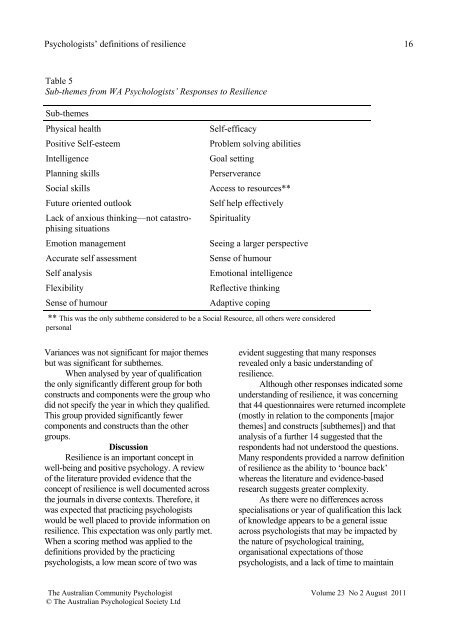The Australian Community Psychologist - APS Member Groups
The Australian Community Psychologist - APS Member Groups
The Australian Community Psychologist - APS Member Groups
You also want an ePaper? Increase the reach of your titles
YUMPU automatically turns print PDFs into web optimized ePapers that Google loves.
<strong>Psychologist</strong>s’ definitions of resilience<br />
16<br />
Table 5<br />
Sub-themes from WA <strong>Psychologist</strong>s’ Responses to Resilience<br />
Sub-themes<br />
Physical health<br />
Positive Self-esteem<br />
Intelligence<br />
Planning skills<br />
Social skills<br />
Future oriented outlook<br />
Lack of anxious thinking—not catastrophising<br />
situations<br />
Emotion management<br />
Accurate self assessment<br />
Self analysis<br />
Flexibility<br />
Sense of humour<br />
Self-efficacy<br />
Problem solving abilities<br />
Goal setting<br />
Perserverance<br />
Access to resources**<br />
Self help effectively<br />
Spirituality<br />
Seeing a larger perspective<br />
Sense of humour<br />
Emotional intelligence<br />
Reflective thinking<br />
Adaptive coping<br />
** This was the only subtheme considered to be a Social Resource, all others were considered<br />
personal<br />
Variances was not significant for major themes<br />
but was significant for subthemes.<br />
When analysed by year of qualification<br />
the only significantly different group for both<br />
constructs and components were the group who<br />
did not specify the year in which they qualified.<br />
This group provided significantly fewer<br />
components and constructs than the other<br />
groups.<br />
Discussion<br />
Resilience is an important concept in<br />
well-being and positive psychology. A review<br />
of the literature provided evidence that the<br />
concept of resilience is well documented across<br />
the journals in diverse contexts. <strong>The</strong>refore, it<br />
was expected that practicing psychologists<br />
would be well placed to provide information on<br />
resilience. This expectation was only partly met.<br />
When a scoring method was applied to the<br />
definitions provided by the practicing<br />
psychologists, a low mean score of two was<br />
evident suggesting that many responses<br />
revealed only a basic understanding of<br />
resilience.<br />
Although other responses indicated some<br />
understanding of resilience, it was concerning<br />
that 44 questionnaires were returned incomplete<br />
(mostly in relation to the components [major<br />
themes] and constructs [subthemes]) and that<br />
analysis of a further 14 suggested that the<br />
respondents had not understood the questions.<br />
Many respondents provided a narrow definition<br />
of resilience as the ability to ‘bounce back’<br />
whereas the literature and evidence-based<br />
research suggests greater complexity.<br />
As there were no differences across<br />
specialisations or year of qualification this lack<br />
of knowledge appears to be a general issue<br />
across psychologists that may be impacted by<br />
the nature of psychological training,<br />
organisational expectations of those<br />
psychologists, and a lack of time to maintain<br />
<strong>The</strong> <strong>Australian</strong> <strong>Community</strong> <strong>Psychologist</strong> Volume 23 No 2 August 2011<br />
© <strong>The</strong> <strong>Australian</strong> Psychological Society Ltd

















